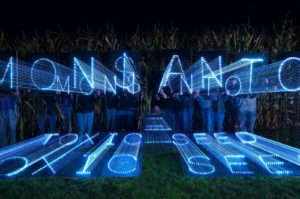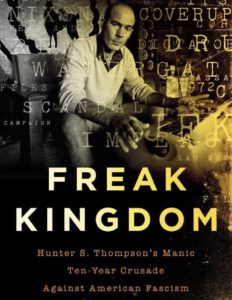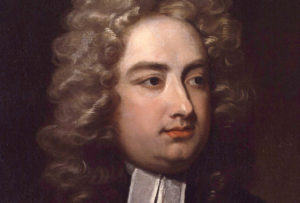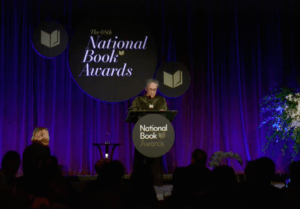(Don’t Fear) Thomas Pynchon
The legendary author of “Gravity’s Rainbow” turns 88 this week, but we’re the ones getting the presents. (Image: Adobe)
(Image: Adobe)
Yes yes yes, the prevailing mindset the world over these days seems to oscillate between the “utterly apocalyptic” and the “merely cataclysmic.” But with Thomas Pynchon marking his 88th birthday on May 8, and with a new novel and an all-star film adaptation promising some Pynchon-riffic days ahead, it’s still a fine time to be alive. In literary terms, anyway.
By way of introduction for the unfamiliar, Mr. Pynchon’s debut novel, “V.”, was released in 1963. To date he has published eight novels, a short story collection, a smattering of essays and some book introductions. He won a National Book Award for 1973’s “Gravity’s Rainbow.” His often uncannily prescient novels are known for their dense interwoven strands of plot, conspiracy and character, often peppered with musical numbers. Blinkered knuckleheads have unfairly branded him “mysterious” and “reclusive” because he opted out of the celebrity machine in order to let the work stand on its own. Some consider him America’s Greatest Living Writer, while others consider him The Greatest Writer America ?Has Ever Produced. He’s our Dostoevsky, our Joyce, our Homer, but, y’know, funnier. (By way of full disclosure, Mr. Pynchon has been kind, if arguably misguided enough to provide wondrous blurbs for two of my books.)
In December of 2022, it was announced Mr. Pynchon had sold his literary archives to the esteemed Huntington Library in San Marino, California. For fans, this was not necessarily good news. He was 85 at the time, and tucking his archives safely away in a research library might signal things were slowing down. His books had never come out on a strict schedule like bestselling thriller series, but it had been nearly a decade since his last novel, “Bleeding Edge.” The way the world was going, and going fast, to maintain our fleeting sanity we were in dire need of a fresh injection of his wisdom, perspective, his deep understanding of history and his bad jokes.
Well, Pynchon news tends to blink into the world in the form of an impish surprise and, true to form, as his 88th birthday approached, the surprises began popping up.
He’s our Dostoevsky, our Joyce, our Homer, but, y’know, funnier.
Although it has long been maintained that Mr. Pynchon’s books were as unfilmable as Joyce’s or Faulkner’s, in 2014 Oscar-nominated director Paul Thomas Anderson (“Boogie Nights,” “There Will Be Blood” and other swell pictures) released “Inherent Vice,” his reasonably faithful adaptation of Mr. Pynchon’s 2009 shaggy dog stoner hippie noir comedy. When Anderson announced in 2022 he was getting down to work on a new project, the rumors began swirling that it would be an adaptation of Mr. Pynchon’s 1990 novel “Vineland,” about a collective of late-’60s radicals who, 20 years later, find themselves confronted with their old nemesis, a malevolent Drug Enforcement Administration agent. Anderson had been talking about adapting “Vineland” since the release of “Inherent Vice,” so maybe this was it.
When the Sept. 26 release date for “One Battle After Another” was confirmed, however, something seemed amiss. Not only had the title been changed, but so had all the character names, with the setting updated from the Reagan Era to the Trump Era. Hmm. The big-budget all-star Leonardo DiCaprio vehicle was being touted as an action thriller, and the trailer didn’t exactly exude that Pynchonian vibe. Still, even though neither Mr. Pynchon nor “Vineland” were mentioned in the film’s press materials, the vague familial resemblance was inescapable.
The rumors were finally confirmed in March when Anderson’s Writer’s Guild of America filing clarified the film was “inspired by” and “loosely based on” “Vineland,” so it seems we really do have a new kinda, sorta Pynchon adaptation to look forward to this fall.
More exciting still, in early April Penguin-Random House announced that “Shadow Ticket,” Mr. Pynchon’s ninth novel and his first in 12 years, would be released on Oct. 7, about a week and a half after the film. It was no surprise that literary websites went all abuzz; but so too did mainstream news outlets. Can you name another living novelist for whom the announcement of a new book makes national news six months before the book’s release?
Now, trying to guess what a Pynchon novel might concern this far in advance is a fool’s errand, but as he’s done since 1997’s “Mason & Dixon,” Mr. Pynchon offered a helping hand by penning the press release himself. “Milwaukee 1932,” it begins:
the Great Depression going full blast, repeal of Prohibition just around the corner, Al Capone in the federal pen, the private investigation business shifting from labor-management relations to the more domestic kind. Hicks McTaggart, a one-time strikebreaker turned private eye, thinks he’s found job security until he gets sent out on what should be a routine case, locating and bringing back the heiress of a Wisconsin cheese fortune who’s taken a mind to go wandering. Before he knows it, he’s been shanghaied onto a transoceanic liner, ending up eventually in Hungary where there’s no shoreline, a language from some other planet, and enough pastry to see any cop well into retirement — and of course no sign of the runaway heiress he’s supposed to be chasing. By the time Hicks catches up with her he will find himself also entangled with Nazis, Soviet agents, British counterspies, swing musicians, practitioners of the paranormal, outlaw motorcyclists, and the troubles that come with each of them, none of which Hicks is qualified, forget about being paid, to deal with. Surrounded by history he has no grasp on and can’t see his way around in or out of, the only bright side for Hicks is it’s the dawn of the Big Band Era and as it happens he’s a pretty good dancer. Whether this will be enough to allow him somehow to lindy-hop his way back again to Milwaukee and the normal world, which may no longer exist, is another question.
News of a new Pynchon novel is always cause for jubilation, and clocking in at a comparatively snappy 384 pages, “Shadow Ticket” is less intimidating a prospect than many of his others. But if you’re a Wisconsinite like me, the novel’s Milwaukee setting nudges that jubilation deep into delirium territory, with the very term “cheese heiress” eliciting potentially dangerous heart palpitations.
You can never read a Pynchon novel too many times.
At the moment I’m two-thirds of the way through a rereading of his 2006 novel “Against the Day.” You can never read a Pynchon novel too many times. Published roughly 35 years after “Gravity’s Rainbow,” and too often overlooked thanks to its imposing 1,100-page heft, “Against the Day” is the work of a mature maestro I’m convinced will one day be recognized as his true magnum opus. I don’t read Mr. Pynchon’s novels, as many seem to, with a mind toward dissecting every conjunction and contraction in order to churn out turgid journal articles about his use of time metaphors or what have you. I also don’t read his novels in order to show everyone within earshot what a big smarty-pants I am. No, I’m a Neanderthal and read Mr. Pynchon’s novels because I like them. The popular perception holds that his books are impregnable fortresses accessible only to super-geniuses. Yeah, and Bob’s your uncle, I say. It’s a myth propped up by insufferable types who want to hold Mr. Pynchon’s work hostage the way the church holds the Bible hostage. Truth is, his novels are perfectly accessible even to Neanderthals like me. They’re literary thrill rides, intellectually exciting on a gut level, outrageous, hilarious — in a word, fun. They’re as lowbrow as they are highbrow, the dumb jokes and slapstick splashing around the room all willy-nilly amid the obscure cultural references, history and science, a singular literary species unto themselves. Mr. Pynchon has an unerring knack for choosing the perfect word, his comic timing is impeccable, and both are on luminous display in a deceptively effortless flow of prose that reveals in every sentence a staggering, almost otherworldly brilliance and imagination that feels downright casual.
It’s an honest privilege to be living in the same world at the same time as Thomas Pynchon, and to still be receiving gifts from an author who, whether he knows it or not, doesn’t have a damn thing left to prove.
Dig, Root, GrowThis year, we’re all on shaky ground, and the need for independent journalism has never been greater. A new administration is openly attacking free press — and the stakes couldn’t be higher.
Your support is more than a donation. It helps us dig deeper into hidden truths, root out corruption and misinformation, and grow an informed, resilient community.
Independent journalism like Truthdig doesn't just report the news — it helps cultivate a better future.
Your tax-deductible gift powers fearless reporting and uncompromising analysis. Together, we can protect democracy and expose the stories that must be told.
This spring, stand with our journalists.
Dig. Root. Grow. Cultivate a better future.
Donate today.








You need to be a supporter to comment.
There are currently no responses to this article.
Be the first to respond.